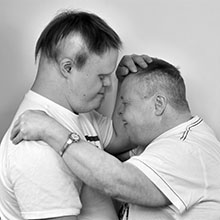Introduction
Six Organisations from five European countries have joined forces to produce this educational e-learning course containing training modules of interest for parents with children with ID.
The themes / topics to which the ELPIDA modules pertain to, emerged from a Needs Assessment Study conducted in Winder 2018. The modules aim to respond to learning objectives for training, awareness raising and/or attitude change in the areas of Human Rights, Communication, Stress Management, Transition to Adulthood, Sexual Health, Ageing.
Each module is provided as stand-alone in the form of a “book” divided in chapters / sub-chapters. It also includes glossary of terms, suggestions on related to the theme/topic activities and, in most cases, external resources (embedded in the “book”). The modules are completed with a forum discussion function and contain evaluation instrumentation for the three phases of the learners; interaction with the modules contents. Learners’ responses to these short questionnaires will be used to upgrade the contents, the method of presentation and the method of delivery of the ELPIDA Course. As the modules imply stand-alone units, participants / learners can choose the order they interact with the provided resources without an obligation to complete all six modules provided. It is envision that the discussion forum will serve as the space for the emergence of a European Community on ELPIDA’s thematic orientation.
The ELPIDA
partnership hopes that through the interaction with the e-learning platform, each participant / learner will increase his /
her knowledge base so as to best support PWID in his / her environment.
 Before you start this e-learning course, we would like to have some information regarding your knowledge and understanding of the modules’ themes. This will prepare you for the content of the course, as well as gathering data on what the participants learn in the e-learning course, assuming that you also complete the evaluation at the end of the course.
Before you start this e-learning course, we would like to have some information regarding your knowledge and understanding of the modules’ themes. This will prepare you for the content of the course, as well as gathering data on what the participants learn in the e-learning course, assuming that you also complete the evaluation at the end of the course.
Please rest assured that any information you provide us with will be treated confidentially. You are welcome to initiate and /or participate in discussions on issues pertaining to PWID.
You are welcome to initiate and /or participate in discussions on issues pertaining to PWID.
 Human rights are basic rights and freedoms that all people are entitled to regardless
of nationality, sex, national or ethnic origin, race, religion, language or
other status. It is important to know your rights in order to be able to
exercise them!
Human rights are basic rights and freedoms that all people are entitled to regardless
of nationality, sex, national or ethnic origin, race, religion, language or
other status. It is important to know your rights in order to be able to
exercise them!  We value your feedback! If you are not interested in any other module(s) of this course, please f
We value your feedback! If you are not interested in any other module(s) of this course, please f When you have a deeper look into issues you are having, very often you will realise that the base of the problem is rooted in bad
When you have a deeper look into issues you are having, very often you will realise that the base of the problem is rooted in bad  We value your feedback! If you are not interested in any other module(s) of this course, please f
We value your feedback! If you are not interested in any other module(s) of this course, please f
 We value your feedback! If you are not interested in any other module(s) of this course, please f
We value your feedback! If you are not interested in any other module(s) of this course, please f
 We value your feedback! If you are not interested in any other module(s) of this course, please f
We value your feedback! If you are not interested in any other module(s) of this course, please f
 We value your feedback! If you are not interested in any other module(s) of this course, please f
We value your feedback! If you are not interested in any other module(s) of this course, please f More people with intellectual disabilities achieves the same life expectancy as the general population. This is good news. In order to promote well-being and quality of life in elderly people with intellectual disabilities, information about aging,
as well as practical support in health, psychological and social issues are needed.
More people with intellectual disabilities achieves the same life expectancy as the general population. This is good news. In order to promote well-being and quality of life in elderly people with intellectual disabilities, information about aging,
as well as practical support in health, psychological and social issues are needed. We value your feedback! If you are not interested in any other module(s) of this course, please f
We value your feedback! If you are not interested in any other module(s) of this course, please f